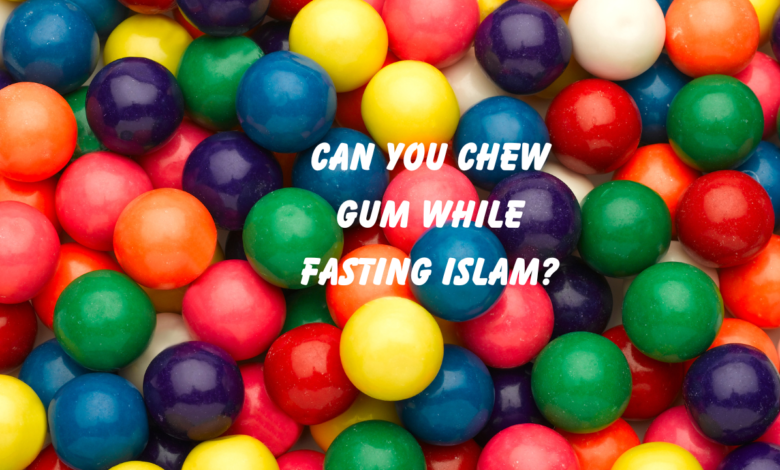Can you chew gum while Fasting Islam?

Can you chew gum while Fasting Islam?

Introduction
Fasting holds immense significance in Islam, observed by millions of Muslims around the world during the holy month of Ramadan. This spiritual practice involves refraining from eating, drinking, and engaging in certain behaviors from dawn until sunset. While the rules and guidelines for fasting are well-defined, modern practices and evolving food trends have given rise to new questions, one of which is whether chewing gum is permissible while fasting in Islam.
The Essence of Fasting in Islam: A Brief Overview
Fasting during Ramadan is one of the Five Pillars of Islam, serving as a means of self-purification, spiritual reflection, and increased devotion to Allah. Muslims fast to draw closer to Allah, seek forgiveness for their sins, and cultivate empathy for those less fortunate. The fasting period begins at dawn (Fajr) and concludes at sunset (Maghrib), during which believers abstain from eating, drinking, smoking, and engaging in sexual activity.
The Debate Over Chewing Gum During Fasting
In recent times, the question of whether chewing gum is permissible while fasting has become a subject of debate within the Islamic community. Traditional Islamic jurisprudence (fiqh) is based on the Quran and the teachings of the Prophet Muhammad (peace be upon him). However, contemporary issues that weren’t directly addressed in classical texts often require interpretation and extrapolation from existing principles.
Chewing gum raises a few concerns within the context of fasting. While gum itself is non-nutritive and does not provide sustenance, it does involve the secretion of saliva and potentially the swallowing of small amounts of flavoring. This has led to differing opinions among Islamic scholars and jurists regarding its impact on the validity of the fast.

Understanding Different Perspectives
Invalidating the Fast: Some scholars argue that anything entering the body, whether through eating, drinking, or otherwise, can potentially invalidate the fast. According to this view, chewing gum, even if it is sugar-free and calorie-free, should be avoided as it could lead to the unintentional consumption of substances that might break the fast.
Permissible Under Certain Conditions: Other scholars suggest that as long as the gum does not contain any nutritional value, and one takes care to avoid swallowing any residue or flavoring, chewing gum might not invalidate the fast. This viewpoint highlights the intention behind fasting – to abstain from nourishment and focus on spiritual growth.
Preferred to Avoid: A middle-ground approach is to avoid chewing gum altogether while fasting. This stance is based on the principle of caution, as it can be challenging to ensure that no unintended consumption occurs.
Varied Practices: It’s important to note that individual practices and cultural norms can also influence a person’s decision regarding chewing gum while fasting. Some communities may be more lenient, while others may adhere strictly to traditional interpretations.
Seeking Knowledge and Spiritual Intentions
In matters of religious practice, seeking knowledge and understanding is of paramount importance. Muslims are encouraged to consult with knowledgeable scholars, imams, and experts in Islamic jurisprudence to make informed decisions that align with their beliefs and circumstances. Moreover, the intention behind fasting is crucial. The act of fasting is not just about abstaining from physical needs but also about cultivating spiritual growth, mindfulness, and empathy.

Conclusion
The question of whether chewing gum is permissible while fasting in Islam remains a topic of debate and interpretation. While traditional principles guide much of Islamic practice, modern developments introduce new complexities that require careful consideration. Ultimately, the decision to chew gum while fasting is a personal one, influenced by one’s understanding of Islamic teachings, their intention behind fasting, and the guidance of knowledgeable scholars.
As with any religious matter, it’s essential to approach this question with an open heart and a desire to uphold the spirit of fasting. Whether one chooses to avoid chewing gum altogether, seeks permission from a qualified scholar, or aligns with a specific school of thought, the overarching goal should be to deepen one’s connection with Allah and to enhance the experience of Ramadan fasting.
FAQs about Chewing Gum While Fasting in Islam
Can I chew gum while fasting in Islam?
Chewing gum is generally discouraged while fasting in Islam, as it may potentially invalidate your fast. Fasting during Ramadan involves refraining from eating, drinking, and other activities that break the fast, including chewing gum.
Why is chewing gum discouraged during fasting in Islam?
Chewing gum can lead to swallowing small amounts of saliva mixed with the gum’s flavoring, which could be considered as consuming something while fasting. The act of fasting is not only about abstaining from food and drink, but also about refraining from anything that might break the fast.
Does sugar-free gum have the same ruling during fasting?
Sugar-free gum is not entirely exempt from the guidelines. While it might not contain calories, it still involves the act of chewing and potentially swallowing substances. Scholars’ opinions vary on this matter, but to ensure the validity of your fast, it’s generally recommended to avoid all types of gum during fasting hours.
Can miswak or tooth brushing be used instead of gum during fasting?
Using a miswak (a teeth-cleaning twig) or brushing your teeth with a toothbrush and toothpaste is allowed during fasting, provided that you’re cautious not to swallow water or any substances while doing so. These practices are encouraged as they maintain oral hygiene and do not generally interfere with the fast.
What if I accidentally swallow some gum residue or flavor while fasting?
Accidental swallowing of a negligible amount, like the residue or flavor of gum, is unlikely to invalidate your fast. Islamic jurisprudence generally focuses on deliberate consumption. However, it’s still better to avoid such situations to maintain the sanctity of your fast.
Can I use gum for medicinal purposes during fasting?
If you’re using gum for medicinal reasons, such as nicotine gum for smoking cessation, it’s advisable to consult with a knowledgeable religious scholar or authority. In some cases, using such gum might be permissible, but guidance from a qualified source is recommended.






